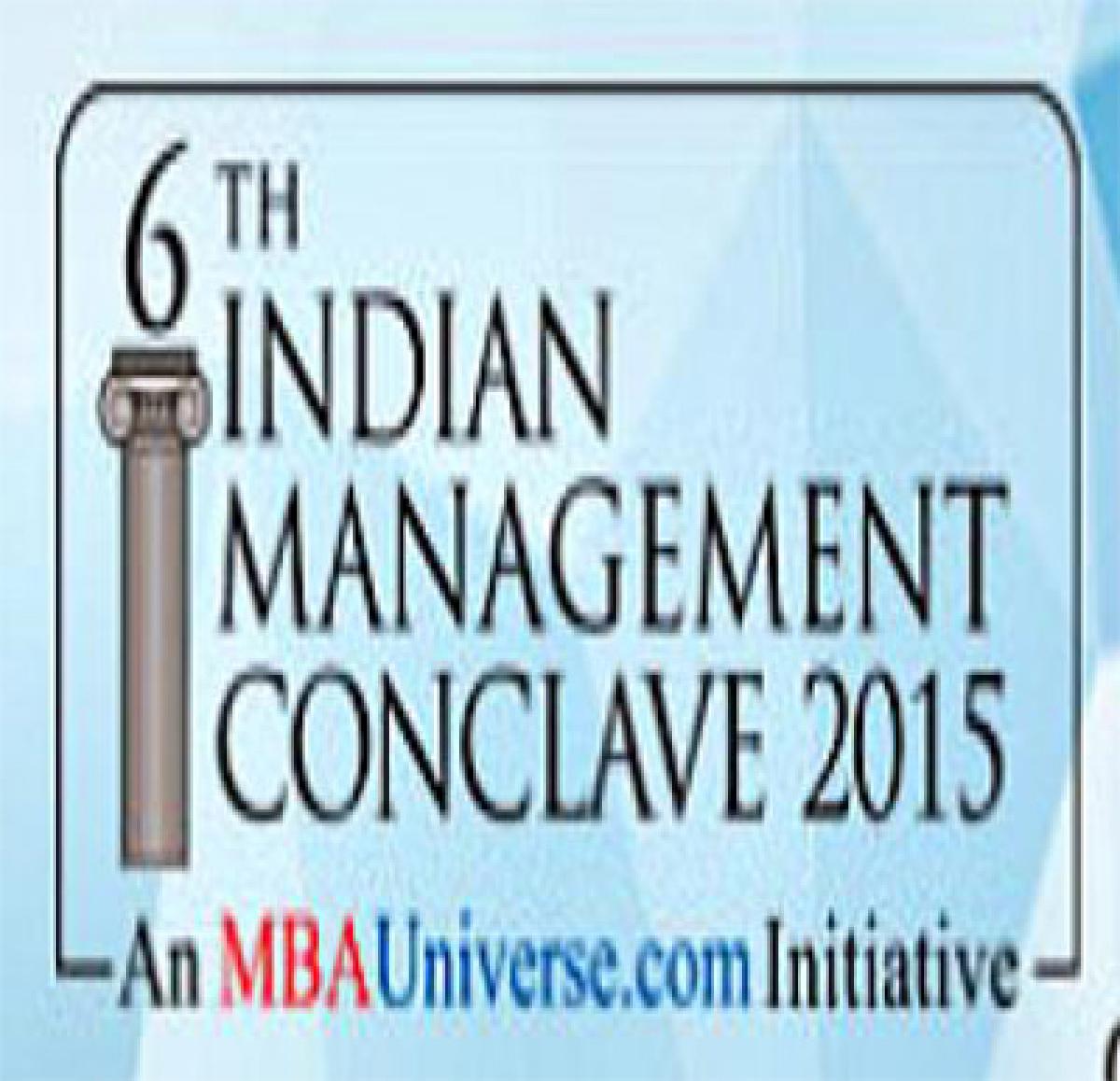Live
- ‘Get Set, Grow Summit 2024’ Focuses on Digital Detox for Families
- Stokes motivates his team to put in extra effort, says England pacer Potts
- From overcoming setbacks to leading India in U19 Women’s Asia Cup, Niki Prasad's amazing journey
- Driving Enterprise Security: Inside Venkata Reddy Thummala’s Leadership Journey
- Constitution debate: PM Modi hails 'Nari Shakti'; makes strong pitch for 'United Bharat’
- Abhijeet Bhardwaj: Revolutionizing Enterprise Analytics with Innovation and Expertise
- Bihar: Inquiry initiated against principal who went to buy veggies during school hours
- Press Sri Lankan Prez for release of Indian fishermen: TN Cong MP to EAM Jaishankar
- TN: DMK postpones executive meet due to heavy rains & Parliament session
- Porous silicon oxide electrodes can fix durability issues in batteries: Researchers
Just In
Focus should shift from learning what to learning how, say academicians


The day-two of the 6th Edition of Indian Management Conclave (IMC 2015) organised by MBAUniverse.com in partnership with Indian School of Business (ISB) at its campus in Gachibowli witnessed participation from across the globe. It had a list of sessions addressed by great management thinkers, top academicians, corporate leaders, deans and directors of top B-schools from India adding light on key academic
6th Edition of Indian Management Conclave
When one looks at the Indian landscape from the point of an educator, we see some very interesting and also challenging things. Right to Education was introduced nearly about 4+ years ago in this country, it was introduced as an Act. A lot of people know about RTI (Right to Information) presently than RTE (Right to Education) Act. It was basically introduced to bring children into the fold of education. However, we still have millions of children without education, from +2 only a small portion makes it to college, 1 in 5 children actually get to go to college.”
.jpg) Hyderabad: The day-two of the 6th Edition of Indian Management Conclave (IMC 2015) organised by MBAUniverse.com in partnership with Indian School of Business (ISB) at its campus in Gachibowli witnessed participation from across the globe. It had a list of sessions addressed by great management thinkers, top academicians, corporate leaders, deans and directors of top B-schools from India adding light on key academic drivers that can enhance student engagement and learning outcomes and also the quality of students admitted.
Hyderabad: The day-two of the 6th Edition of Indian Management Conclave (IMC 2015) organised by MBAUniverse.com in partnership with Indian School of Business (ISB) at its campus in Gachibowli witnessed participation from across the globe. It had a list of sessions addressed by great management thinkers, top academicians, corporate leaders, deans and directors of top B-schools from India adding light on key academic drivers that can enhance student engagement and learning outcomes and also the quality of students admitted.
Addressing the delegates on the key areas and strategies of ‘Enhancing B-school Competitiveness’, the theme of this conclave, Dr Madhukar Angur, Chancellor of Alliance University, Bangalore said that this is the capstone session for this conclave. “This is an important topic for all us educators. You probably know about the educational landscape in India, we could have changed this topic to talk about how to build competitiveness of Indian higher education around the world, because when you think of other disciplines are we in the top 10 or top 50 in the world, well it’s very hard to say,” he said.
The quality of education is another issue Dr Madhukar Angur highlighted, he said “As educators we’ll try and do what we are doing in one discipline and hopefully what we are doing in this discipline will have a spill over effect in other disciplines. He listed some of the challenges we face in this discipline, one is employability factor which is bothersome, he said.
He also added that “Our employability per cent is just about 15 per cent. As educators, we need to say that whoever our graduates are not readily absorbed in the market place and that is of concern. We need to do something competitive however we define competitiveness. We lack in global visibility, our school don’t have global visibility. Even IIM-Ahmedabad is a hidden jewel. If you really look at what we really have in terms of horse-power we have not been able to make it to global rankings.
The third issue is research visibility or productivity, number of patents filed, number of research papers. US has 600 thousand papers published, but India only 60,000 papers. We also have entrepreneurship issues. Many of the times we look at education as a process and sometimes as a project. We are essentially focusing on ‘learning what’, what should the student learn…but what’s more important is, are we enhancing the ‘learning how’ process of the student,” he added.
‘Can Technology Enable Quality Education at Scale?’ Dr Bharat Anand, Faculty Chair, HBX Initiative and Henry R Byers Professor of Business Administration, Harvard Business School, addressed the delegates on this theme. Dr Bharat Anand highlighted the importance of digital technology and how it presents large opportunities for transforming education.
“In June 2014, Harvard Business School launched HBX, its new online education initiative. At the time, the focus of other B-schools was to create an individualised experience where students would primarily watch streamed video lectures from experts.Stimulating lectures with star professors, perhaps, but lectures nonetheless with a passive, individualised learner experience HBX wanted to change that. To that end, HBX designed a program that would focus on solving real-world business problems, encourage active learning and foster social and collaborative learning.”
An example cited showcased the management thinking and practices at Akshya Patra, which runs world’s largest mid-day meal programme serving free food to over 1.4 million children from 10,770 schools in India by leveraging technology and innovative delivery models. The IMC 2015 concluded with a valedictory address by Dilip Shanghvi, Managing Director of Sun Pharmaceutical.

© 2024 Hyderabad Media House Limited/The Hans India. All rights reserved. Powered by hocalwire.com






